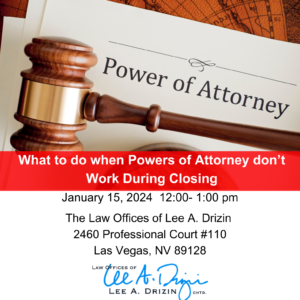Navigating Probate in Spring Valley, Nevada: What You Need to Know
Imagine this: A world-famous musician passes away, leaving behind a treasure trove of albums, royalties, and memories while also leaving a tangled web of legal disputes over their estate. Picture a legendary film star whose heirs spent years in court fighting over their iconic mansion. Even the rich and famous, from Prince to Chadwick Boseman, have faced the complexities of probate when they didn’t have their affairs in perfect order.
For everyday residents of Spring Valley, Nevada, probate may not involve billion-dollar estates or high-profile headlines, but it still brings its own set of challenges, confusion, and stress. An estate can be likened to a puzzle, and probate is the structured process of assembling its pieces to ensure each asset is allocated appropriately. Whether you’re dealing with the legal system for a loved one or planning to spare your family the headache, understanding probate is crucial. At its essence, probate is the legal process of settling a deceased individual’s affairs. It serves as the concluding chapter in a person’s financial narrative, ensuring that all outstanding debts are resolved, taxes are paid, and assets are distributed to the rightful heirs or beneficiaries in accordance with the law.
In this guide, we’ll unpack everything you need to know about probate in Spring Valley, including what it is, when probate is required, and how you can make the process as seamless as possible. Let us get started.
The Probate Process in Spring Valley, Nevada
Here is a concise overview of the probate process in Spring Valley, Nevada:
- Determining the Need for Probate
a) Probate is necessary if:
- The deceased owned real property titled solely in the decedent’s name.
- The estate’s value exceeds Nevada’s small estate threshold.
- No alternative transfer mechanisms such as joint tenancy with right of survivorship, community property with right of survivorship, payable-on-death (POD) accounts, and transfer-on-death (TOD) deeds are in place.
- Probate may be avoided if:a) The estate qualities for simplified administration (e.g., estates under $25,000 or $100,000 for surviving spouses).b) Assets were jointly owned or transferred through a living trust.
- Filing a Petition for Probate
The process begins with filing a Petition for Probate in the Clark County District Court, The petition includes details about the deceased, their assets, and heirs, along with the will if applicable. The court schedules a hearing to validate the will and appoint a personal representative. - Appointment of the Personal Representative
The personal representative manages the estate. They may be named in the will (executor) or appointed by the court (administrator). The court issues Letters Testamentary or Letters of Administration, granting the authority to manage the estate.
- Notification of Interested Parties
The personal representative must notify heirs, beneficiaries, and creditors of the probate proceedings, ensuring transparency and giving interested parties an opportunity to participate or contest.
- Inventory and Valuation of Assets
The personal representative compiles and appraises the estate’s assets, including real estate, bank accounts, personal property, and business interests. This inventory is filed with the court. - Settling Debts and TaxesDebts are settled before distribution. The estate’s debts and taxes (federal estate tax, Nevada income tax) are paid from estate funds, and assets may be sold if necessary.
- Resolving Disputes
The court resolves disputes, such as will validity challenges or disagreements among heirs or creditors. - Distributing the Remaining Assets
Once debts and taxes are settled, assets are distributed according to the will or Nevada’s intestacy laws if no will exists. A final report is filed with the court detailing the distribution.
- Closing the Estate
The personal representative submits a final accounting, which the court reviews and approves. The representative is then discharged, and the estate is officially closed.
Common Challenges in the Spring Valley Probate Process
Below are the common challenges faced during the probate process in Spring Valley, along with strategies to address them effectively.
- Delays in Probate Proceedings
a) Why it Happens:
- Incomplete documentation: Missing or improperly filed documents can cause significant delays.
- Court backlogs: The Clark County Probate Court may experience delays due to high caseloads.
- Contested wills: Disputes over the validity of the will can extend the probate timeline.
b) Impact:
Delays can prolong asset distribution, leaving beneficiaries waiting and increasing administrative costs. - Disputes Over the Will’s Validity
a) Why it Happens:- Allegations of forgery, undue influence, or lack of testamentary capacity are common.
- Conflicting versions of the will may emerge.
b) Impact:
Will contests can result in lengthy legal battles, substantial legal fees, and family discord.
- Difficulty Locating and Valuing Assets
a) Why it Happens:- The deceased may not have maintained updated records of their assets.
- Assets may be located in multiple jurisdictions or hidden in complex investments.
b) Impact:
The personal representative (executor) may struggle to inventory and appraise assets accurately, delaying probate.
- Handling Debts and Creditor Claims
a) Why it Happens:- Outstanding debts and unclear liabilities can complicate estate settlement.
- Creditors may file claims that are disputed or excessive.
b) Impact:
Failure to settle valid claims or mismanagement of debt payments can lead to financial burden upon the estate.
- Family Conflicts and Disputes Among Heirs
a) Why it Happens:- Differing interpretations of the will or unequal asset distribution can lead to disputes.
- Long-standing family tensions may resurface during probate.
b) Impact:
Contentious disputes can escalate into legal battles, increasing costs and delaying asset distribution.
- Managing Complex Estates
a) Why it Happens:- Estates with diverse assets, such as businesses, intellectual property, or international holdings, require specialized expertise.
- Tax implications and regulatory compliance may complicate administration.
b) Impact:
Managing a complex estate can overwhelm the personal representative and extend probate timelines.
- Insufficient Estate Planning
a) Why it Happens:- The deceased may not have created a valid will or may have outdated documents.
- Key assets may not be titled properly to avoid probate (e.g., jointly owned or held in a trust).
b) Impact:
Intestacy laws may apply, resulting in distribution that does not reflect the deceased’s wishes and potentially excluding certain heirs, including those not desired.
- Tax and Financial Challenges
a) Why it Happens:- While Nevada has no estate or inheritance tax, federal tax obligations or other financial complexities may arise. Also, a final income tax return for the decedent may be due.
- Errors in tax filings can trigger penalties or audits.
b) Impact:
Mishandling tax obligations can reduce the estate’s value and lead to legal consequences for the personal representative.
- Personal Representative Mismanagement
a) Why it Happens:- Lack of knowledge or experience in probate administration.
- Misuse or misappropriation of estate funds.
b) Impact:
Poor management can harm beneficiaries and expose the personal representative to legal liability.
- Unique Challenges in Spring Valley
a) Why it Happens:- Local probate nuances, such as court-specific requirements in Clark County.
- Community property laws in Nevada, which may affect the distribution of marital assets.
b) Impact:
Failure to account for these local factors can lead to delays and legal complications.
How to Avoid Probate in Spring Valley
Avoiding probate can save time, reduce costs, and maintain privacy. Here are several strategies to minimize probate in Spring Valley, Nevada:
- Create a Living Trust
Transfer assets into a trust during your lifetime. The trust allows assets to pass directly to beneficiaries without probate. - Joint Ownership of Property
Options like Joint Tenancy with Right of Survivorship and Community Property with Right of Survivorship allow property to pass directly to the surviving owner without probate. - Designate Beneficiaries
Designating beneficiaries for accounts like Payable-on-Death (POD) or Transfer-on- Death (TOD) accounts ensures assets transfer without probate - Use Nevada’s Small Estate Affidavit
For estates under $25,000 ($100,000 for surviving spouses), heirs can use a small estate affidavit to avoid probate. - Title Real Estate as a Transfer-on-Death Deed (TODD)
Record a TODD with the county to transfer real estate directly to a beneficiary without probate. - Gifting Assets During Your Lifetime
Gifting assets reduces the estate size, potentially avoiding probate, with annual exclusions of up to $18,000 per person. - Simplify Ownership of Personal Property
Gift or transfer personal property below the small estate threshold to avoid probate. - Establish a Durable Power of Attorney
A durable power of attorney allows a trusted person to manage financial affairs if you become incapacitated, avoiding complications in probate. - Work with a Probate Attorney
A probate lawyer in Spring Valley can help structure your estate to minimize probate and ensure compliance with Nevada laws. - Regularly Update Your Estate Plan
Review your estate plan regularly to ensure it reflects life changes and avoids unintended probate.
Role of a Probate Attorney in Spring Valley
A probate attorney in Spring Valley, Nevada plays a key role in guiding executors, beneficiaries, and other parties through the probate process. They ensure compliance with state laws, handle legal filings, manage asset inventories, and ensure tax compliance, reducing the risk of errors and delays. The attorney also helps locate, identify, and appraise assets, resolves creditor claims, and facilitates the fair distribution of assets in line with the decedent’s wishes. in case of disputes, they mediate and represent parties in court to minimize conflicts and legal costs.
Additionally, a probate lawyer in Spring Valley can help to streamline the process by identifying cost-saving measures and expediting requirements, ensuring timely distribution of assets. They assist with future estate planning by advising on strategies like living trusts, wills, and beneficiary designations to avoid probate. Executors receive support in fulfilling their fiduciary duties, with legal protection against mismanagement claims. The probate attorney also addresses unique challenges, such as out-of-state heirs or high-value estates, ensuring the probate process is effectively managed in line with local and state-specific considerations.
This article is for informational purposes only and does not constitute legal advice. The information provided herein should not be relied upon as legal advice, and it may not reflect the most current legal developments. You should consult with a qualified probate attorney in Spring Valley, Nevada, to discuss your specific legal needs and obtain professional guidance.








